In the nightmare of corruption, murder and impunity that is post coup d’état Honduras, many political and economic sectors of the “international community,” foremost the U.S. and Canada, maintain beneficial relations with drug trafficking enterprises. Rights Action shares Karen Spring’s dissection of a recent U.S. money laundering bust in Miami of the Rosenthals, one of Honduras’ elite families.
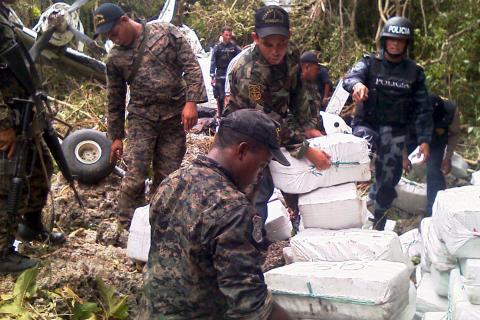

What’s going on with the Rosenthals?
By Karen Spring, Published in Aqui Abajo
Yesterday, the U.S. Department of the Treasury’s Office of Foreign Assets Control (OFAC) indicted three members of the Rosenthal family – Jaime Rolando Rosenthal, Yankel Antonio Rosenthal, Yani Bejamin Rosenthal – for money laundering related to illicit activities and international drug trafficking. Jaime Rosenthal and family have since published two communiques denying the charges and declaring their innocence. The news of the Rosenthal bust hit the press yesterday when the DEA prevented Yankel Rosenthal from boarding a flight from Miami destined for Tegucigalpa. The sanctions against the Rosenthals are a very surprising move by the U.S. as the Rosenthal family is one of the wealthiest and most prominent of the Honduran elite with strong ties to the Liberal Party, one of the two traditional political parties that have controlled and dominated the Honduran Congress for decades.
Jaime Rolando Rosenthal is a former Vice President of Honduras, and a major, if not THE major player, in the Liberal Party of Honduras. He owns Banco Continental, a large, national bank in Honduras, and the center-right newspaper, El Tiempo, which he founded in 1970 after a conflict as a founding investor in the national newspaper La Prensa, owned by Jorge Larach. The extent of the Rosenthals’ investments managed under their company, Continental Group (Grupo Continental) are vast and include businesses in the coffee, banana, cacao, sugar industry, live stock, various residential and real estate companies, amongst many others. The Rosenthal family is a media magnate owning the El Tiempo newspaper, Canal 11 (together with Gilberto Goldstein), and Cable Color. According to Honduran journalist Manuel Torres Calderon, “through his Jaimista Movement, Rosenthal has been considered – in the liberal governments – as an “owner” of a quota of power in the National Congress, Supreme Court of Justice, ministries and key dependents of public administration, among them the National Telecommunications Commission (CONATEL).”
His son, Yani Rosenthal, also sanctioned by the U.S. OFAC for “money laundering and drug trafficking activities” is a former Presidential candidate for the Liberal Party, and heavily involved in his family’s businesses. His cousin, Yankel Rosenthal stopped in Miami by the DEA, is married to the daughter of another very prominent and wealthy business man, Gilberto Goldstein. Yankel is President of the Rosenthal’s soccer club, Club Marathon, based in San Pedro Sula. When he appeared in court yesterday with his wrists handcuffed to a chain at his waist, Hondura’s Channel 6 reported that he “could not stop his tears when seeing his daughter in the Miami court.”
An interesting commentary about Yankel breaking down in court, is circulating around social media was made by former public prosecutor and lawyer representing the Broad Movement for Dignity and Justice (MADJ by its Spanish acronym), Victor Fernandez:
“I have seen so many poor people crying when their family member is sent to prison (or subject to police or military force), but the poor have always been closer to jail and all of its respective abuses. I imagine that this family (Rosenthal), with so much power and money in this country, will feel that the world is falling in on them, and now, will live what many Honduras live day to day. But the biggest impact that this news should generate, is the confirmation (because we all knew it) that Honduras, for years, has been governed by gangs.”
STORY: Honduras: Narcotrafficking Leads to Native Dispossession, Deforestation
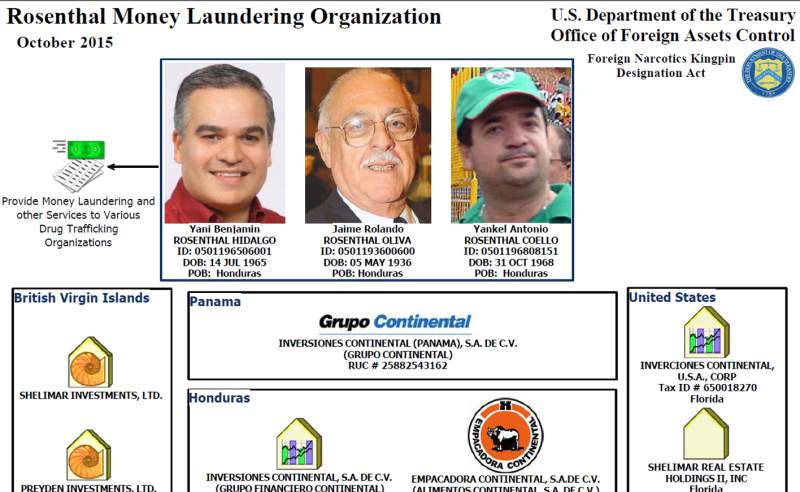

The sanctioning of the three Rosenthals raises tons of questions and lots of speculation. I’ve outlined a few theories that have been circulating in the social media:
Theory 1. Banco Continental may have been involved in the narco activities and money laundering schemes of the Los Cachiros drug cartel. The Rivera Maradiaga brothers handed themselves over the U.S. authorities in the Bahamas and its possible that as part of the negotiations of their arrest, that they would hand over information that incriminated individuals in the Honduran government and prominent businesses, including Honduran banks involved in laundering. Its possible that Banco Continental was connected somehow to Los Cachiros.
Other points to consider: Various Honduran banks are thought to be involved in narco and money laundering activities, although none other than Banco Continental are being touched by U.S. authorities. A recent complaint was filed in Panama against Camilo Atala, owner of the largest Honduran bank, Banco FICOHSA for alleged money laundering and conspiracy to commit a crime. Banco FICOHSA was also flagged and now under investigation by the International Financial Corporation, the private-arm of the World Bank, for its involvement in loaning money to Dinant Corporation linked to hundreds of campesino killings and human rights abuses in the Aguan Valley.
From what has been reported, the complain against FICOHSA in Panama seems not to have anything to do with the U.S. government or respective U.S. investigations. Banco FICOHSA recently bought out City Bank Honduras, and in general it is suspected that under the new loan signed with the International Monetary Fund (IMF), the Honduran banking system is becoming increasingly integrated into the global market, including strong, parent ties to big U.S. banks. As the 2013 HSBC scandal has taught us, U.S. banks themselves aren’t innocent in money laundering activities related to Latin American drug cartels either.
“This action targets the three Rosenthal family members and their properties for their money laundering and drug trafficking activities. This step underscores that the U.S. government is fully committed to protecting the U.S. financial system from criminals like the Rosenthals. We are fully committed to working with the Honduran authorities to take the necessary steps to protect the Honduran financial system from abuse by drug traffickers and other illicit actors, in order to further safeguard Honduran financial institutions.” — Adam J. Szubin, U.S. Acting Under Secretary for Terrorism and Financial Intelligence
Theory 2. The Rosenthal bust is simply a blow against Honduran President Juan Orlando Hernandez’s political enemies and critics. Since Jaime and Yani Rosenthal were both prominent politicians and actors in the Liberal Party of Honduras, some say that the Rosenthal family is being targeted because of its open criticisms of the Juan Orlando Hernandez (JOH) government and the National Party via their newspaper, El Tiempo. With major Liberal Party actors out of the picture, the U.S. move will further strengthen the JOH government as decommissioned property or assets will be in the hands of the party that controls the Honduran state, the National Party.
Other points to consider: Although Jaime and Yani Rosenthal are both big time Liberal Party politicians and supporters, Yankel had just ended his relationship with the Liberals and joined the National Party ranks. In 2013, Yankel publicly threw his support behind JOH’s Presidential candidacy and in February 2014 until June 2015 was the Ministry of Investment Promotion. A brief video interview circulating on social media, shows Yankel stating that “we” [and its unclear who “we” is] support him [JOH] in his conviction, economically, and we are going to support him with a vote as well.” So although Jaime Rosenthal is the definitely the big name in the family and the Liberal Party, at least one of the three Rosenthals accused by the U.S. is sympathetic to JOH.
Something else to consider when examining the argument that going after the Rosenthals is in short, strengthening JOH’s regime, is that the National Party has suffered some drug busts as well. For example, the Valle Valle family, whose members have been captured and extradited to the U.S. as well, were major financiers of JOH’s campaign, and Los Cachiros have strong links to the National Party. Fabio Lobo, the son of former National Party President Porfirio “Pepe” Lobo was allegedly captured in Haiti by the DEA on charges of drug trafficking linked to Los Cachiros. Some people in Honduras believe that Lobo was actually arrested in Honduras and then taken to Haiti and ‘officially’ captured in order to lower the political impact of the charges.
Other loans followed, including to the Cachiros’ vast African palm holdings. The Rosenthals say the relationship made sense because their strength is working in agriculture projects. They said that Continental has three branches in Tocoa, the epicenter of Cachiros’ operations during their heyday.
“They were good clients for us,” Patricia Rosenthal said. “Another important thing is that the bank’s strength is in the north, which includes the northern coast, and we are the strongest bank in agriculture and housing. [This is] because the board of directors that presides over the bank has always believed that it is our duty to give back to these areas in Honduras.” — Insight Crime
STORY: Obama Must Stop Funding Honduras’ Corrupt President
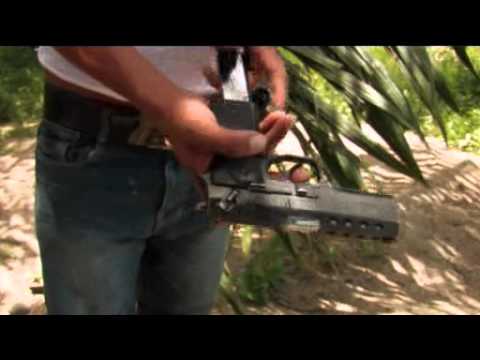
Watch this video on YouTube
In short, there is lots of speculation about the recent arrests and accusations against the Rosenthals. Time will tell how it will play out. Regarding the U.S. government’s role in the last few years of money laundering scandals and arrests related to drug trafficking, are a few points that are clear to me:
** The U.S. are cherry-picking criminals — going after some while not touching others that are just as bad if not worse than the Rosenthals.
** Who gets extradited, how, and where they are captured or handed over to the U.S. is clearly being negotiated between the U.S. government and some institution(s) or group(s) in Honduras behind closed doors. The U.S. seems to be calling the shots and dragging Honduran investigative bodies and institutions along for the ride.
** The U.S. continues its obsession over cracking down on (some) drug trafficking and illicit activities in the name of the War on Drugs, that is inherent to the neoliberal political and economic system in Honduras. The drug war is used as a justification to militarize and terrorize Honduran society while homicide rates and insecurity remain alarmingly high. If you ask Hondurans from the social movement if they are surprised about the U.S. naming the Rosenthals as criminals, they will likely tell you that everyone knows the Honduran elite are involved in illicit activities of some sort, but that they are surprised that the U.S. is taking out one of its historically important allies – a prominent and wealthy Honduran family.
** The long-term support by the U.S. for the Honduran oligarchy has assisted in generating and expanding the power and influence of a handful of Honduran political and economic elite. The U.S. support for the June 2009 military coup being the most recent example. The coup led to skyrocketing homicide rates and insecurity, and allowed for drug traffickers and criminals to operate in almost a complete state of impunity. It is this state of impunity that has generated more drug trafficking, higher levels of insecurity, and mass corruption including the multi-million dollar Social Security scandal (IHSS) that has had a tremendous impact on Honduran society as well.
Karen Spring is a human rights activist and the Honduras-based Coordinator for the Honduras Solidarity Network (HSN). Ther work focuses on educating North Americans about the impacts of the political and economic policies of the U.S. and Canadian governments, transnational corporations, and International Financial Institutions, in Honduras and the region.



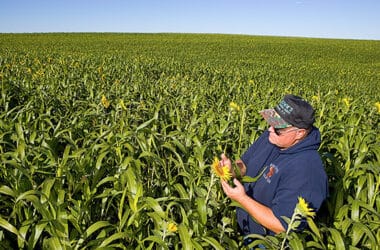
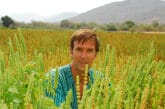




Pingback: In Little Honduras a Loyal US Client, and Tyrant, Backed by Trump and the Bananan Republicans | Donald J. Trump No. 45
Pingback: In Little Honduras a Loyal U.S. Client, and Tyrant, Backed by Trump and the Bananan Republicans
Pingback: In Little Honduras a Loyal U.S. Client, and Tyrant, Backed by Trump and the Bananan Republicans | InstantViral